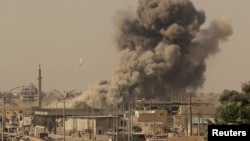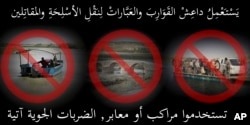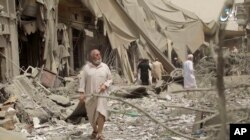Rights group Amnesty International says thousands of civilians are trapped in the northern Syrian town of Raqqa, in what it calls a "deadly labyrinth" in the line of fire from all sides — coalition forces as well as Islamic State (IS) fighters.
Amnesty released a report Thursday saying hundreds of civilians have been killed or injured since June, when an offensive began to recapture the IS stronghold.
The United Nations said as many as 50,000 displaced persons may be in Raqqa, many sheltering in the city center or other areas controlled by IS, where they may be used as human shields by IS fighters.
Amnesty said one resident described how a dozen shells struck a residential area in Daraiya on June 10, killing at least a dozen people ranging in age from infant to elderly.
"The shells struck one house after another," Amnesty quoted her as saying. "It was indescribable. It was like the end of the world — the noise, people screaming."
Escape by water
Amnesty noted that coalition forces present a danger to civilians on boats crossing the Euphrates River, one of the only viable routes for civilians trying to escape Raqqa.
A U.S. coalition commander, Stephen Townsend, told The New York Times in July that his forces "shoot every boat we find."
The report said coalition forces dropped pamphlets in March, warning civilians not to use ferries and boats to escape because of the danger of airstrikes.
In addition to dangers from coalition forces, IS forces have been using tactics to keep civilians in Raqqa to serve as human shields. Amnesty said IS fighters have been using landmines and booby traps at exit points of the city, and checkpoints around the city, to restrict movement.
Residents say they have little if any food, electricity or medical care. They also have little power against the militants who control the city.
Trouble to the south
Amnesty's report also noted that villagers south of the Euphrates River have been trying to survive against an onslaught by Russian-backed Syrian forces.
Eighteen civilians were reported killed in the area in July after what Amnesty called "indiscriminate airstrikes" that may have been the result of cluster bombs, which are banned internationally.
Amnesty said atrocities committed by IS notwithstanding, all parties to the Syrian conflict have a responsibility to abide by international legal standards for warfare and civilian protection.
"Those besieged in Raqqa face horrific brutality at the hands of IS — of that there is no doubt," said Donatella Rovera, Amnesty senior crisis response adviser, who led the investigation leading to the report.
"But violations by IS do not lessen the international legal obligations of other warring parties to protect civilians. This includes selecting lawful targets, avoiding indiscriminate or disproportionate strikes, and taking all feasible precautions to minimize harm to civilians," Rovera said.







